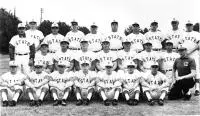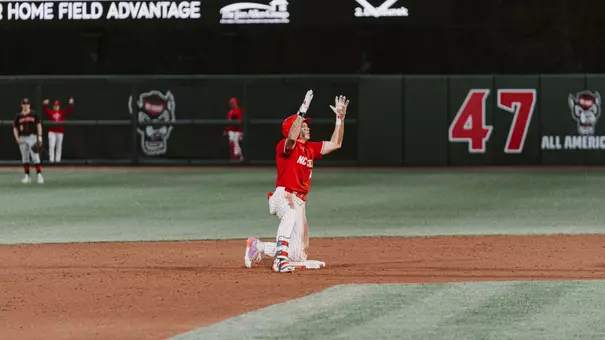North Carolina State University Athletics

The Wolfpacker Remembers 1968 College World Series
2/9/2007 12:00:00 AM | Baseball
BY TIM PEELER
RALEIGH, N.C. When the members of the 1968 NC State baseball team met the weekend of Homecoming, 2006, for their first reunion in 37 years, they weren’t sure what to expect.
After being exceptionally close as teammates, the players had drifted their own separate ways. Two of them went to the Major Leagues. Others went into business, achieving great levels of success.
The only person who remained in the same place was head coach Sam Esposito, the person who took the raw talent that showed up that March and made the players believe they could be one of the best teams in the nation.
Nearly 20 years after he retired as the Wolfpack baseball coach in 1987, Esposito is still making the daily trip to the office.
So it was for the benefit of the 73-year-old coach, and former Major Leaguer, that the players decided to reunite for a weekend of activities, which began with a round of golf at Wildwood Greens Country Club, continued Friday night with dinner and a roast at Amedeo’s Restaurant and peaked when they were introduced to a cheering sell-out crowd between the first and second quarters of the NC State-Southern Mississippi football game.
“It was beyond special,” said Chris Cammack, the former third-baseman who batted .351 as a freshman in 1968.
“We couldn’t have asked for a better weekend,” said Steve Martin, the former All-America outfielder who organized the reunion. “The school treated us like we were some kind of kings.”
Not really, of course. Kings are much more plentiful therefore, somehow less worthy than the small number of players, coaches and student managers who have ever taken NC State to the College World Series.
In the 100 years that NC State has been playing baseball (1903-2005, minus three years without a team during World War I), the 1968 team is the only one to ever go to CWS, which has been held annually since 1947. Just getting there was about as unlikely for this team as Norm Sloan’s 1970 basketball team beating top-ranked South Carolina for the ACC title or Jim Valvano’s 1983 basketball team winning the NCAA tournament.
And while history well remembers Destiny’s Darlings, as the media declared Dereck Whittenburg, Sidney Lowe, Thurl Bailey and their teammates, the unexpected success of Esposito’s second Wolfpack team was no less thrilling.
Before the season started, Esposito said his team’s prospects were “iffy.” He didn’t mean iffy for making the school’s first trip to Omaha; he meant iffy for matching the previous season’s 11-11 mark.
He had only three pitchers two of which were freshmen. He didn’t have any big bats the team hit only 12 home runs all season long. The left side of his infield third baseman Chris Cammack and shortstop Darrell Moody started the season with injuries, and senior starter Alex Cheek pitched with a broken toe the second half of the season.
It was only Esposito’s second year with the Wolfpack, and he was still getting settled into his double duties as the head baseball coach and an assistant basketball coach. But the former utility player for the Chicago White Sox knew how to teach the game, motivate his players and mold everyone into a tight-knit family that had no idea it wasn’t supposed to be able to compete with the best teams in the ACC, let alone the country.
That’s exactly what happened, however, in the 25-9 season, in which the Wolfpack won the school’s first ACC championship, beat Florida State for the NCAA District III title and came within a bad call at home plate against St. John’s and one terrific defensive play by a Southern California centerfielder from winning the school’s first team national title.
Stories from that season long ago filled the dark corners of Amedeo’s the night before Homecoming.
“We must have told 500 stories,” said Cammack, the native of Fayetteville who hit .351 that year for the Wolfpack. “Almost all of them were true.”
The relived the world’s longest double, hit by Cheek not long after he suffered his broken toe, at Virginia. There was no fence at the Cavalier field, and Cheek hit a ball that went almost 500 feet, according to his teammates. He pulled up at second and didn’t go any further.
Cammack’s favorite story was from the night before the Wolfpack played third-ranked Florida State in the District III championship game. State had already lost to the Seminoles coached by Esposito’s former White Sox teammate Fred Hatfield by a score of 15-12 a day before.
“We watched them take batting practice before their games,” Martin recalled. “It looked like a softball game.”
Esposito was going with a freshman pitcher from Tarboro named Mike Caldwell, who had already won one game in the district tournament and had pitched a one-hit masterpiece against Wake Forest in the regular-season finale to clinch the ACC title. Against the Demon Deacons, Caldwell allowed a hit on the first pitch of the game, then watched as catcher Francis Combs threw him out stealing second. The only other Wake base runner that day was erased by a double-play.
So when a reporter stopped by Cammack’s and Caldwell’s hotel room in Gastonia the night before the deciding game against the Seminoles, Caldwell didn’t hesitate to say “We’re only one run and nine innings away from a trip to Omaha.”
When the reporter left, Cammack lit into his teammate. “You dumb sonofa----. He’s going to print that in the paper.”
And he did. They saw the clippings the next afternoon on the Florida State dugout. The Seminoles never tired of getting on Caldwell the whole game. But they didn’t hit him either, and he pitched another masterful game, winning 4-1.
Once in Omaha, the Wolfpack felt a little out of place with teams like Southern Cal, Texas, Southern Illinois and St. John’s. For one thing, Esposito’s team had the lightest suitcases of any of the eight participants.
“There was a pre-tournament meeting that was mainly to talk about which uniform combination the teams would wear,” Cammack said. “They went around the room and teams would say We’ll wear the gold pants with the white shirts or the red shirts and the white pants.’ Every combination you could think of.
“Every time they came to Esposito, he said I think we will wear the white uniforms with red pinstripes and red socks.’ Those were the only ones we had.”
The biggest cheer from the Wolfpack contingent during its time in Omaha came when the team learned, following their 6-5 win over second-ranked Texas, that their heavy wool uniforms would be washed for their showdown with Southern California.
In that game, Esposito had no choice but to send sophomore Tommy Smith, a little-used reliever to the mound to face the top-ranked Trojans. He had pitched only 15 1/3 innings all year long.
But pitching wasn’t the downfall. For the only time all season, the Wolfpack was not able to get a run across the plate, despite having multiple opportunities in the final four innings.
In the sixth, Francis Combs led off with a single but the inning ended when USC’s centerfielder made a diving catch to rob Clem Huffman of a potential triple or inside-the-park home run. The Wolfpack couldn’t score after loading the bases in the eighth with three consecutive singles.
And in the ninth, Martin was left stranded at second.
It was one of the few times all season long that the Wolfpack offense failed to produce a clutch hit.
But the tie for third place in the national tournament is still the best in school history, and the 37 years that have passed since then haven’t faded the Wolfpack players’ belief that they deserved to be there.
“We were equal to anybody out there,” Martin said. “In baseball, sometimes it’s the way the ball bounces.”
Esposito often referred to that particular team as “River Rats,” because they were so hard to kill. You just couldn’t get rid of them.
“Two things stand out about them,” Esposito told A.J. Carr of the Raleigh News & Observer. “They loved baseball and they played real hard, just busted it every day.”
The team statistics show that it was a light-hitting team that still managed to score nearly seven runs a game. It was fast on the bases, not surprisingly modeled after the Go-Go Sox that Esposito was a part of in 1959, which lost to the Los Angeles Dodgers in the World Series. The Wolfpack stole 59 bases that year to its opponents’ 19.
“The thing about that team is that we didn’t have one or two great players, we had 20 players,” said Martin, who was named second-team All-America as an outfielder in 1968. “We didn’t have any heroes, no jealousy, we just played together like family.
“Coach Esposito was one of the greatest coaches I ever played for. He taught us to win, he taught us to play hard and to play to win. We thought we were going to win every time we played.”
Caldwell went on to have a long career in the major leagues, pitching for four different teams in a 14-year career. He won two games in the 1982 World Series for Milwaukee and was the runner up to Ron Guidry of the New York Yankees for the 1978 American League Cy Young Award, after compiling a 22-9 record.
Caldwell, now a pitching instructor in the Detroit Tigers’ organization, came back from Phoenix, where he is managing a winter-league team. All the king’s horses couldn’t have kept him away.
“We did a reunion of the 1982 Milwaukee World Series team a few years ago,” said Caldwell, who still lives in Raleigh during the off-season. “And in a lot of ways, this reunion of our ’68 College World Series team was more special, because it was something from our youth.
“We were kids, and no one expected us to do anything, let alone go to Omaha. It was tremendous that we were able to get together again.”
Smith, the pitcher who was called into action for the game against USC, also made it to the Majors, playing in 121 games during a five-year career with the Cleveland Indians and the Seattle Mariners.
Esposito never took another team back to the World Series, but he did win three more ACC titles (1973-75) and never had a losing season in his 21 years as a head coach.
With health problems limiting his ability to spend long stretches away from home, no one knew if Esposito would be able to make more than a token appearance at any of the baseball reunion’s festivities.
“We were just hoping he would feel like showing up,” Cammack said. “He stayed three hours. His wife couldn’t believe it. But that is what our Friday night dinner was all about, him, not us.
“I really do believe that by the end of the night he really did understand how much we love him and what we feel about him.”
Kings, indeed.
Tim Peeler is the managing editor for www.GoPack.com and a regular contributor to The Wolfpacker. You may contact him at tim_peeler@ncsu.edu.




